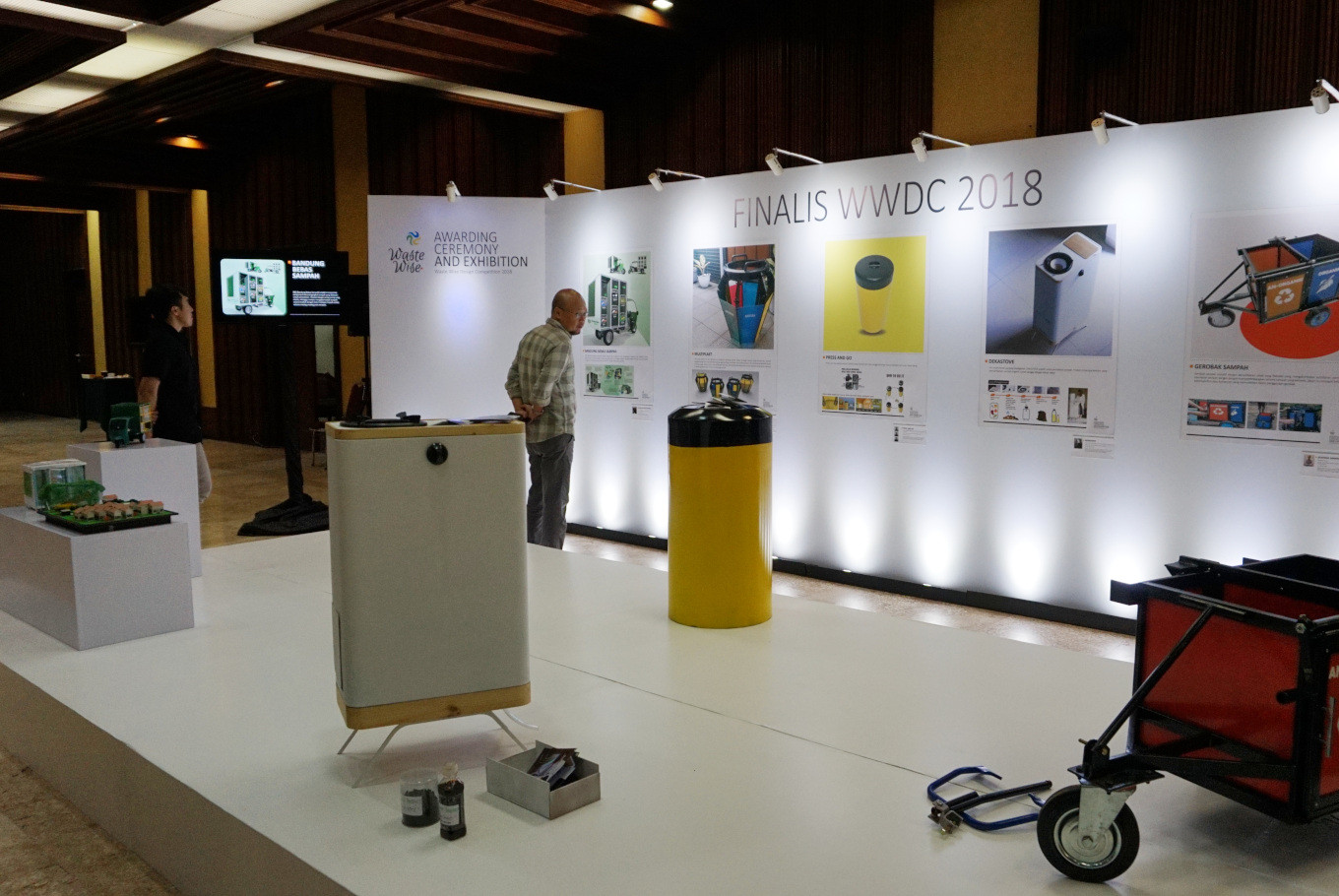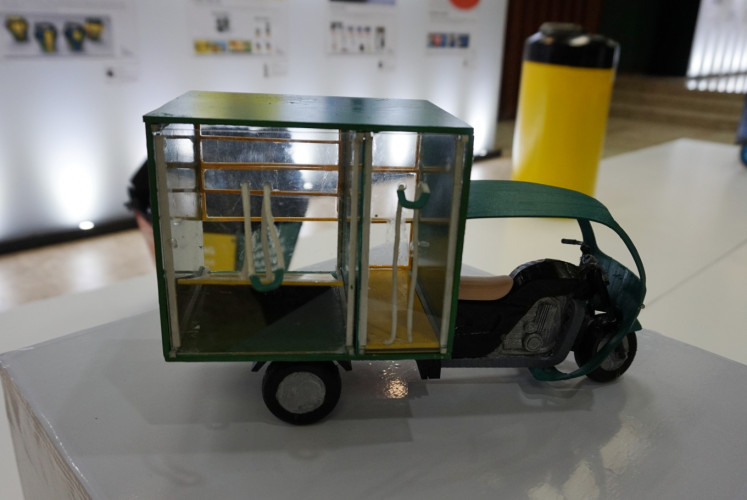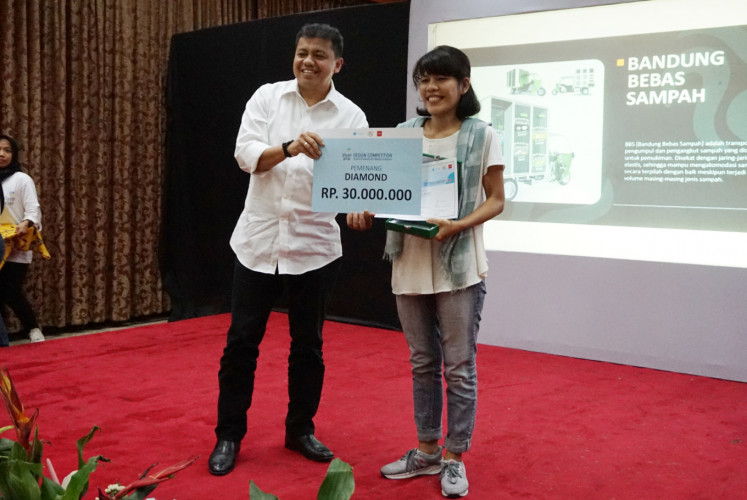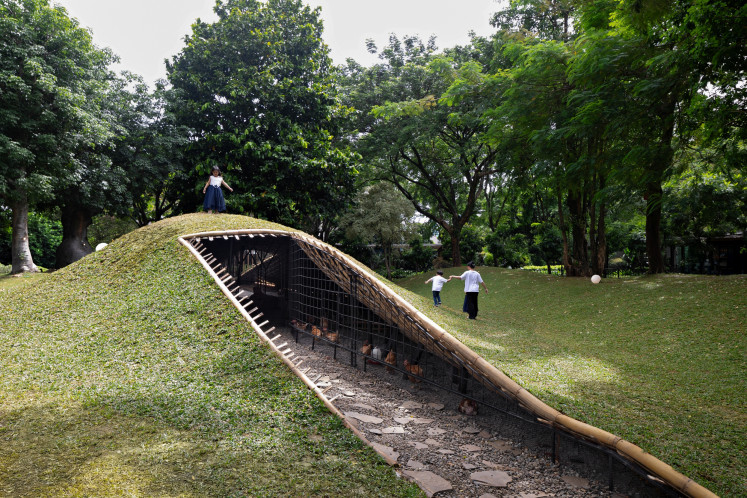Popular Reads
Top Results
Can't find what you're looking for?
View all search resultsPopular Reads
Top Results
Can't find what you're looking for?
View all search resultsWaste management design winner wants garbage free Bandung
Designed by Lastri Naibaho, Bandung Bebas Sampah encourages people to sort their waste at home.
Change text size
Gift Premium Articles
to Anyone
B
andung Bebas Sampah (Garbage Free Bandung) is a new waste management system for the community unit (RW) level. It encourages residents to separate their waste at home before it is transferred to a temporary trash disposal site (TPS).
The system was designed by university student Lastri Naibaho, who given the Diamond Award trophy, a certificate and a cash prize of Rp 30 million (US$2,071) at the 2018 Waste Wise Design Competition (WWDC) held at Manggala Wanabakti in Central Jakarta on Dec. 12. The event was a collaborative effort between the 73 Bandung Institute Technology Forum (Fortuga) and the Indonesia Industry Production Designer Alliance (ADPII), with support from the Greeneration Foundation.
Bandung Bebas Sampah was developed based on Lastri’s online survey and research in Sukaluyu village in Bandung, West Java. The survey involved 68 respondents and found that only 25 percent sorted their garbage at home.
“They said sorting was useless because everything would be mixed in the garbage carts,” Lastri told The Jakarta Post after the event.
A mock-up Bandung Bebas Sampah garbage cart on display for the 2018 Waste Wise Design Competition. (JP/Ni Nyoman Wira)The system consists of several phases. Garbage is sorted at home based on its type, namely soft organic (cheese, banana skin etc), hard organic (egg shells, bones etc), recyclable inorganic (plastic bottle etc), sanitary inorganic (tissue papers, disposable diapers etc) and other types of inorganic waste. The waste is grouped in separate bags with different colors, such as net bags for recyclable inorganics and green and transparent compostable plastic bags for organics.
“People will bring their own garbage to trash bins provided in certain points in each of the neighborhood units [RT],” said the student of the School of Art and Design (FSRD) at the Bandung Institute of Technology (ITB).
The garbage carts will collect the trash based on a schedule. Mondays, Wednesdays, Fridays and Sundays are for inorganic waste, while Tuesdays, Thursdays and Saturdays are for organic waste. The carts are designed to have flexible separators and sliding doors, so drivers will have minimum contact with the garbage.
Read also: Surabaya touts waste management to win 2018 Guangzhou Award
Lastri Naibaho (right) poses with Novrizal Tahar, the Environment and Forestry Ministry's director of waste management at the 2018 Waste Wise Design Competition. (JP/Ni Nyoman Wira)Based on Lastri's plans, the organic waste can be recycled at RW sanitary posts at the community unit level into different outputs, including compost, while the rest of the garbage will be brought to the TPS. She also expects her design to be applied in real life, especially in Sukaluyu village.
Aside from Lastri, WWDC announced other winners as well. The Golden Awards were given to Press and Go by Syaidinna Aditia, Ikhwanul Firdaus and Muhammad Alif Subandi; Dekastove by Muhammad Abdurrohim and David Wahyu Permadi; and Gerobak Sampah Organik dan Anorganik (Organic and Inorganic Trash Cart) by Adhi Susatyo. Each winner received a certificate and cash prize of Rp 15 million.
Gerobak Sampah Organik dan Anorganik also won the competition's Favorite category. Dino Fabriant, head of the judges, explained that the Favorite Award winner was selected by members of Fortuga.
“I was also surprised that the Organic and Inorganic Trash Cart was chosen, but apparently it answers the problem of those who already separate their garbage [at home], but later find out that its all mixed together in the trash cart,” said Dino.
A mock-up Gerobak Sampah Organik dan Inorganic trash cart designed by Adhi Susatyo is exhibited for the 2018 Waste Wise Design Competition. (JP/Ni Nyoman Wira)Additionally, Fikri Satria Antoni, the creator of Multiplast, also received funds from the Greeneration Foundation and PT Waste4Change Alam Indonesia.
WWDC 2018 aims to find solutions for Indonesia’s waste management through efficient and innovative products that allow waste to retain value by being reusable. It encourages people to do more than just throw their garbage out in a trash bin, but to separate it so it can be processed later on.
Five finalists were selected from 75 applicants to receive the awards. The selection process involved two phases. Selected participants had to bring mock-ups of their ideas during the second phase. The aforementioned ideas and products are expected to raise awareness and help solve the country’s waste management issues. (kes)














